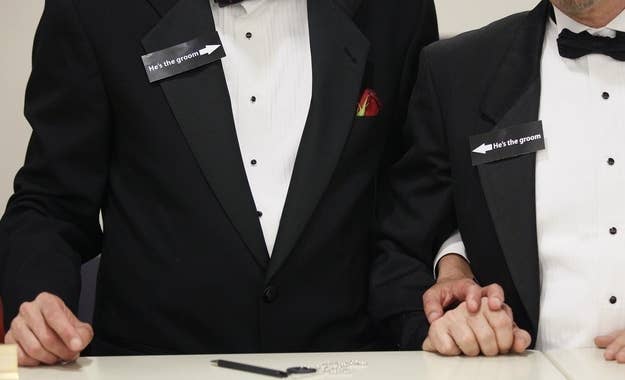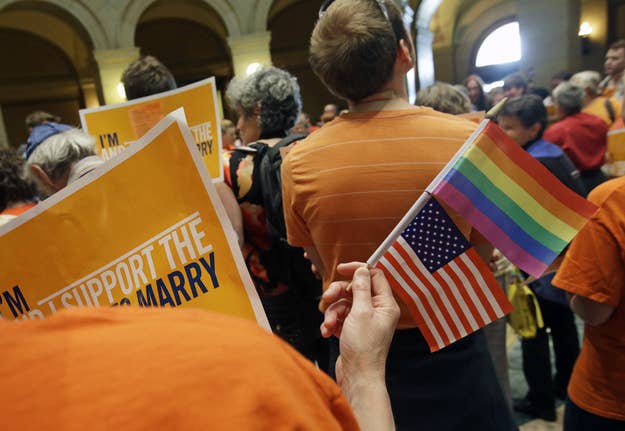
The news rippled through LGBT media in early May: according to the CDC, gay and bisexual men were getting less promiscuous, sleeping with fewer partners than they were ten years ago. Some speculated that this was an unintended effect of marriage equality: were men getting married and "pruding-up," as Queerty's Lester Brathwaite put it?
Not so much, says porn star and blogger Conner Habib. "That's ridiculous," he says of the study, which found that the average number of sex partners per year for men who have sex with men (MSM) declined from 2.9 in 2002 to 2.1 in 2006-2010. "I have no idea where they would've found that," he added. And a number of experts who work with gay men agree those men's sex lives haven't changed. If anything, gay men might change marriage, not the other way around.
"I don't put much stock in this research," says Charles Silverstein, a longtime therapist and author of books on gay life. "At the moment the gay community is a bit terrified about the new meningitis strain that's going around," he notes, "but I think gay men are having as much sex as they've always had."
Joe Kort, therapist and author of 10 Smart Things Gay Men Can Do to Improve Their Lives, agrees — by and large, he says, the gay men in his practice don't seem to have changed their sexual habits. However, he has noticed that some younger men "are acting more like straight people," meaning "they're dating and they're not hooking up as much." As it's more acceptable to be out, he says, young gay men may be entering into longer relationships. The CDC research did find that the decrease in partners was most pronounced among younger men.
But committed relationships don't always mean fewer sex partners. Joshua Rosenberger, a professor who works on sexuality and health at George Mason University, says that "as much as [LGBT] people want equal rights, they're not looking to just be the same as" straight people. Compared to heterosexual couples, gay men are more likely to have "relationships that are monogamous in a variety of ways but not sexually." And, he says, "I don't see that changing as a result of marriage equality or things of that nature. If anything [marriage equality is] allowing people to maintain the romantic aspect of their relationships, while being able to more openly navigate the sexual aspect." Getting married might give gay couples more security and stability, helping them feel better having frank discussions about sexual boundaries and what kinds of sexual non-monogamy might work for them.
Habib agrees: "Most gay marriages that I know about are not monogamous marriages." At least when it comes to sex, maybe gay men are actually redefining marriage, rather than letting it redefine them.

If these men aren't necessarily settling down into sexual monogamy, what's behind the drop the CDC saw? Study coauthor and CDC researcher Jami Leichliter declined to speculate on this: "The purpose of this study was to capture a clearer understanding of what is happening on a national level in terms of sexual risk among MSM, but it wasn't designed to answer questions about why we see certain trends."
But Rosenberger thinks the drop may be at least in part a function of better science. In the past, he says, "the CDC and academic institutions have not necessarily done the best job documenting the sexual behaviors of MSM outside of HIV risk behaviors. The ways that we measured things were pretty crude." It's hard to even track trends yet, he explains, because researchers don't have a good baseline of historical data to work from.
That may come with time. Rosenberger calls for more holistic research into gay men's sexual and romantic lives, not just their STD risk factors. "We focus so much on the negative things that men do, like alcohol and substance abuse," he says. But now researchers are just beginning to study "the influence of being in love, of feeling happy, of trusting somebody. How do those influence sexual behavior?" In other words, the kind of relationship research that's long been done on straight couples is only beginning to be conducted with gay men.
It may be an ideal time to study such things. Though homophobia isn't dead (witness the recent spate of attacks in New York), the more people around the country accept same-sex relationships, the more those relationships can thrive. Says Dr. Kenneth Mayer, co-chair of The Fenway Institute, which focuses in part on LGBT health: "If you feel like your relationship is validated and there's not a social price to pay for being public in the relationship, that can lead to more support for the relationship, to help you work things through when there are stressful periods." Of course gay men have always been forging happy relationships, even against high odds, but now, there are fewer obstacles in their way.
And at the same time, the gay community finds itself in flux: says Habib, "We're sort of stuck in this thing between marriage and acceptance and tolerance and retaining our identity, which historically has been pretty sexually infused." Many gay men are trying to figure out what it means to marry, buy a house, and have kids, without becoming just like straight couples. And while now may be a perfect time to study gay men's relationships in more detail, it's also a time of great change. Says Habib, "This is a really weird and unique moment, and even what we learn about it today might not be valid in a year."
